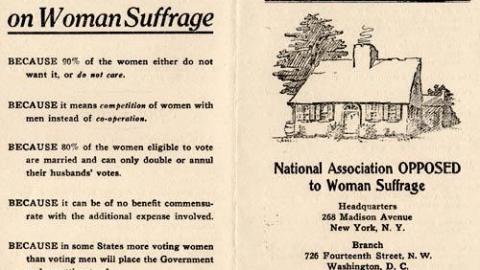Why Rachel Held Evans Won’t Change Christianity

Some progressive Christian bloggers I respect have been writing enthusiastically about a new book, Rachel Held Evans’ A Year of Biblical Womanhood, which they say proves that the Bible has been misused to justify patriarchy and demands for female submission. When the book became a bestsellerdespite evangelical denunciation, they’ve seen it as proof that a cultural shift is underway among Christians.
I haven’t read the book myself, but I’m not so optimistic. I’d be happy if they were right, but I think patriarchal ideas are much more entrenched in Christianity than they realize, and it’s going to take much, much more than one book to undo them. I say so because of another story this month, the Anglican church’s shock defeat of a proposal for female bishops:
Those against felt the concept of female bishops could not be reconciled with scripture, and felt that compromise, for that reason, was not a Christian value.
The proposal needed a two-thirds majority in all three houses of the church’s General Synod to pass. It met that mark in two houses, but narrowly fell short in the third, the House of Laity. It had been widely expected to pass, and its defeat was described as “disastrous“, a “bewildering catastrophe” and a “humiliation” for the outgoing archbishop of Canterbury, Rowan Williams. One commenter said, “I think I have just watched the Church of England commit suicide.”
The stunning defeat of female bishops, even in a supposedly liberal mainstream church, shows how deeply rooted within Christianity are ideas of female leadership and female subservience. I think this is something that progressive believers underestimate. It’s not just a matter of the “clobber verses” that command women to be silent, but of the fundamental worldview that’s woven into the Bible from start to finish.
Consider that, in Christian teaching, God is explicitly male. In fact, he’s male twice over – the Father and the Son. Whether you read the book of Genesis metaphorically or literally, either way it says that God created man first and woman to serve him. The Old Testament recounts a continuous lineage of male Israelite kings, except for one queen, Athaliah, who came to power in a bloody coup and reigned only a few years. All the major prophets of the Old Testament were men. Jesus was a man, and he chose twelve men to be his apostles. And all the authors of the Bible’s individual books are identified as men.
This kind of sexism is baked into Christianity’s origin, which makes it almost impossible to eradicate. If the Bible were a constitution, where you could add amendments, that would be one thing – but it isn’t, and you can’t. The best you can do is emphasize or reinterpret old stories to give them more woman-friendly messages, but at best this is tinkering around the margins.
None of this can erase the fundamental truth of a biblical worldview where the unquestioned assumption is that men are the prime movers, the leaders, the holders of agency and the makers of decisions, whereas the primary role of women is to gracefully submit, to be obedient and invisible. You can tell the story of Deborah as many times as you want, but this message still comes through loud and clear.
When progressive Christians try to put an egalitarian spin on the Bible, it’s the same unconvincing argument made by corporations that claim to not be sexist because their board of directors has nineteen white men and one woman. You can praise that one woman for her leadership skills or recount her brilliant business decisions, but there’s still an unmistakable message being sent. And how much more powerful is that message when it’s not a corporate board, but the chosen followers of God himself?
Image via The Oncoming Hope
Daylight Atheism: The Book is now available! Click here for reviews and ordering information.





